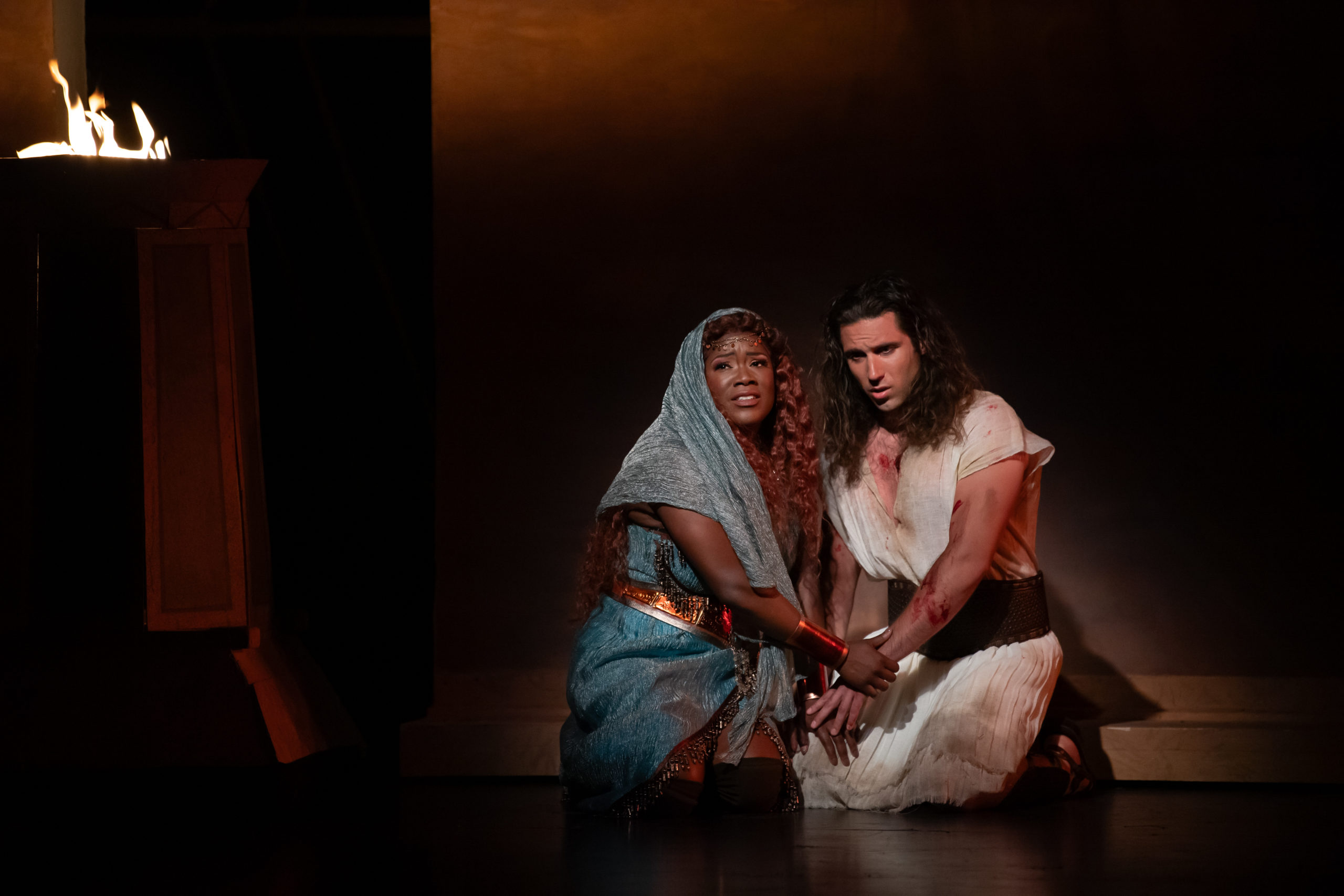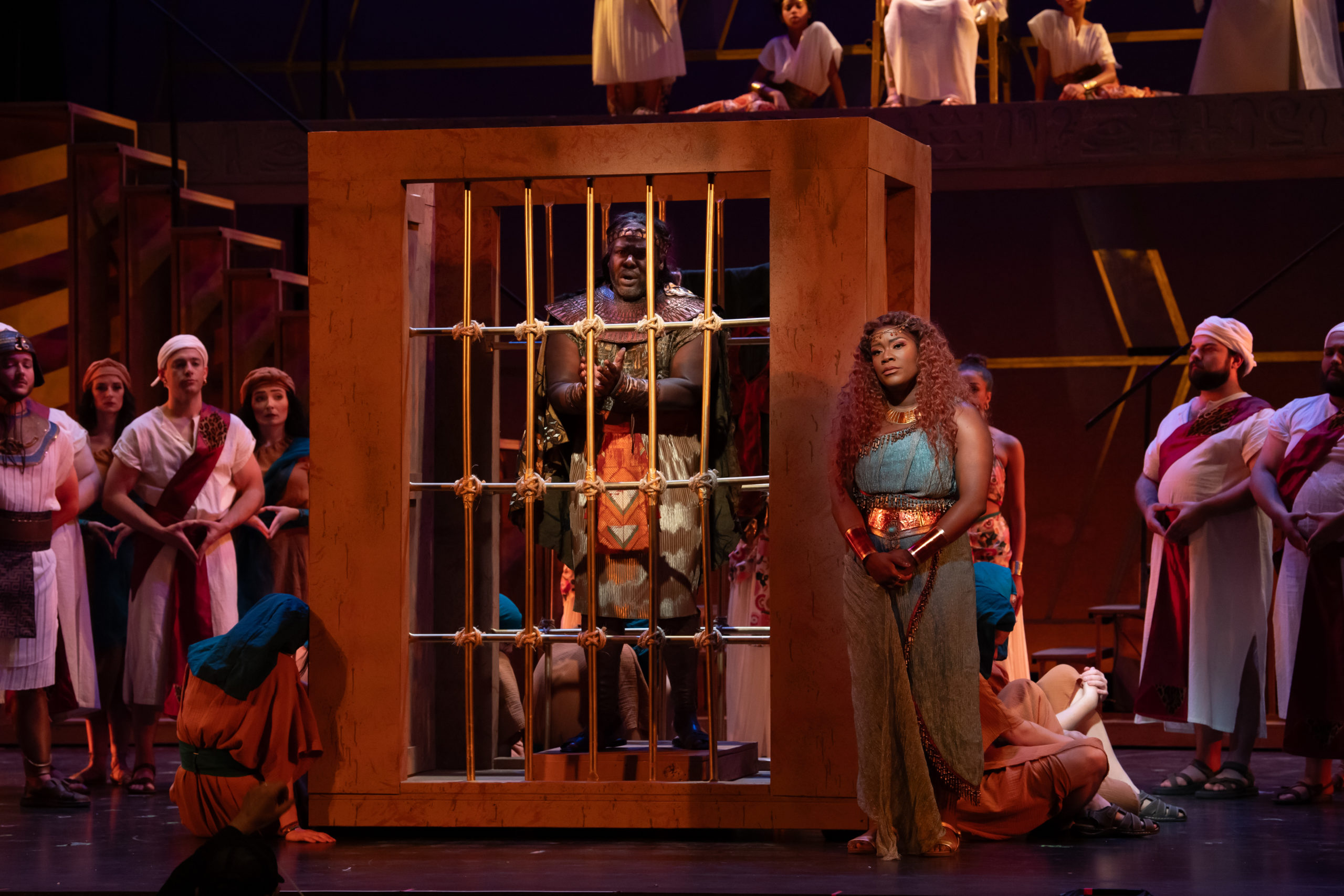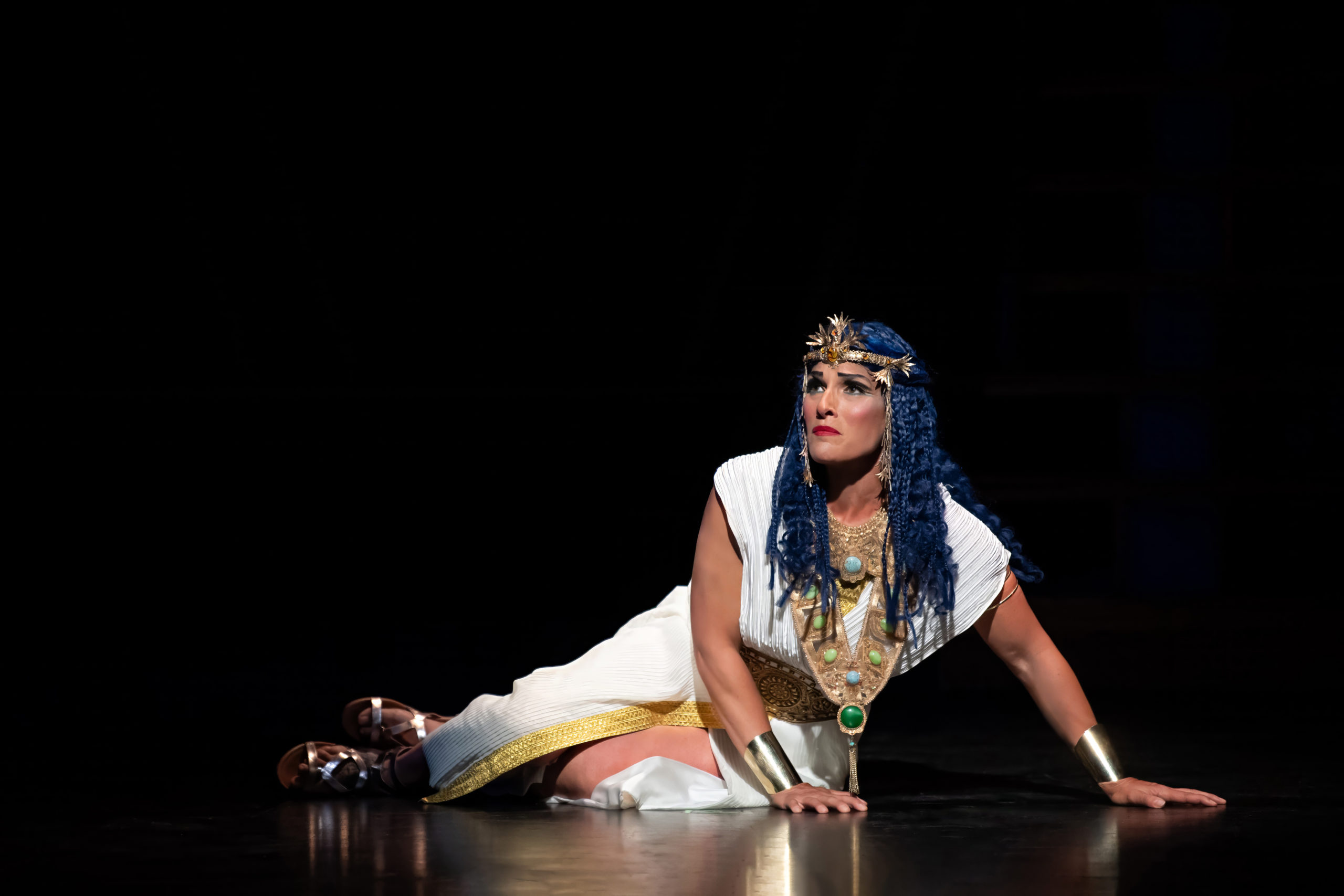LOGAN — Giuseppe Verdi’s Aida has triumphantly marched into the Ellen Eccles Theatre at the Utah Festival of Opera and Musical Theatre in Logan. Directed by John de los Santos, UFO&MT’s opera Aida was a majestic sight to behold. Verdi wrote Aida over 150 years ago in a time when European nobility were fascinated with ancient Egyptian novelties and thrilled with stories of the alluring land. Although this classic opera was written so long ago, its grand scenes of Egypt and beautiful arias are still a wonderful treat for the eye and ear.

The opera Aida tells the story of Radamès (played by Victor Starsky), an Egyptian soldier who is in love with Aida (played by Carami Hilaire), a slave that is a handmaiden to the Princess Amneris (played by Audrey Babcock). Radamès is made the captain of the army and sets off to fight the Ethiopian army, which just invaded Egypt. In the meantime, Amneris is determined to find evidence of Aida’s love for Radamès, whom she also loves. Radamès returns victorious with the ward and has captured Amonasro (played by Thomas Cannon) as a prisoner, whom Aida recognizes as her father, the king of Ethiopia. Now Aida must decide if she will help her father, or will she be devoted to her love with Radamès. With Amneris and Radamès set to be married, the stage is set for a spectacular dramatic climax.
Enjoying a night at the opera is not just about the storyline. It is also about the transcending music that moves the story along. Conductor Nicolas Giusti led the full orchestra through the exhilarating feats of the four act opera. Complementing the amazing orchestra was a full cast of talented opera singers whose professional performances in Aida were nothing less than spectacular. Hilaire’s clear voice sang the aria’s of Aida with an amazing range, and she is glorious especially when she hits her high notes with ease and grace. She shows true depth of expressions as she sings about the heartache she feels for her family and country and the discordant feelings in still loving Radamès. Aida’s heart-wrenching despair as her father disowns her and blames her for the agony and war of all their people was extremely moving.

Radamés is the heroic tenor and love interest of both Aida and Amneris. Starsky’s singing is superb and filled with great vibrato, especially noted in scene 1 as he sings about his love for Aida. Starsky was stoic as he was vowed to go to war against the Ethiopians. Singing with blood smeared across his chest and forehead, Starsky is set to be a fierce warrior for Egypt.
Babcock plays the jealous and conniving Egyptian princess, Anmeris. She shows a strong motive to win Radamès’s heart and destroy her rival Aida. Babcock excels at putting so much emotion into act IV while reasoning with Radamès and adding great intensity of the scene. However, Babcock’s vocals are too quiet and get lost during act I as the trio sings together about Radamès becoming a warrior. Brandon Coleman plays Ramfis, the high priest adorned with a leopard skin across his shoulder. His strong low bass notes resonate throughout the theatre as he calls for Egypt to go to war against the Ethiopians. Cannon is remarkable in the role of Amonasro as he is rolled onto stage in a caged jail cell. He is fearsome and powerful as he demands Aida to leave with him and never see Radamès again.
De los Santos’s direction is superb throughout the performance, but crowning the night was the beautiful music from Act II, Scene 2, the Triumphal March. The trumpets sounded triumphantly from the balcony joining the orchestra and filling the theatre house with an exuberant feeling of victory. The chorus marched across the stage with the spoils of war and dancers performed a beautiful ballet which culminated in a portrayal death with a dancer being speared for show in the procession.

Costumes designed by Erin Carignan fit the ancient Egyptian feel, yet were elegant and theatrical. Amneris was dressed in a slim linen white tunic adorned with a golden collar and girded waist. The blue beaded headdress she wore made Babcock look as beautiful as Cleopatra. The red and white ombre dress worn by the High Priestess (played by Jasmine Ismail) was elegant and beautiful, as it matched the white costumes with red sashes worn by the priests and priestesses at the temple. Slaves and servants wore tan brown costumes with brown turbans accented with turquoise sashes. The systematic costuming of the cast created a grand view of the hierarchical caste system of ancient Egyptian society.
Verdi’s Aida is known for awe inspiring grand scenes, and set designer Patrick Larsen delivered many visually opulent scenes. Especially impressive was the interior of the Temple of Vulcan in Memphis, which seemed immense with large staircases leading to an upper walkway. An impressive statue of the Egyptian goddess Isis was a grand centerpiece to the backdrop of the temple.
Act III, set by the banks of the Nile River, begins with such visual and musical delight. The sound of the orchestra playing music echoing the flow of the water and birds along the rivers banks painted such a musical picture, one could almost see it before the curtains were drawn. As the set came up a beautiful scene was set with the diagonal stairs, like a pyramid, with tall palm trees and a large moon in the backdrop that was lit white against a deep blue to indigo ombre sky.

Originally written in Italian, UFO&MT decided to perform this classic opera in German with English subtitles projected above the stage. However, there is no need to worry the language barrier. With a quick read of the synopsis in the program, it is easy to follow along with the story. At times when the subtitles were not displayed, the story is told through the beautiful music without the audience needing to see the exact words.
UFO&MT not only is performing Verdi’s Aida this season, but also Elton John’s adaptation of the opera into a rock/pop musical from 2000. Each production has something amazing to offer, and both appeal to a wide variety of audiences. It is a rare treat to be able to see both shows so well done with professional singers and live orchestras. Elton John’s Aida provides an incredible introduction for younger and more modern audiences to become familiar with the tragic love story, while Verdi’s Aida elevates the respect for musicians and performers with such challenging and dynamic music. I encourage everyone to see both Aidas.
[box]The Utah Festival Opera & Musical Theatre production of the opera Aida plays July 8, 14, 20, 26, 29 and August 5 at 1 PM or 7:30 PM at the Ellen Eccles Theatre (43 South Main Street, Logan). Tickets are $23-$89. For more information, visit utahfestival.org.[/box]

